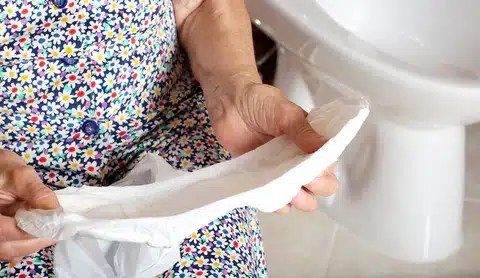Many people identify incontinence as an embarrassing problem experiences only by the elderly. However, you may be surprised to find that incontinence affects people of all ages and genders, for a wide variety of reasons. So join us today as we debunk what your mother has told you about incontinence!

Why Do I Leak a Little Bit, Sometimes?
The mother of all incontinence myths is that all women leak a little, that it isn’t incontinence. However, incontinence is defined as ANY accidental or involuntary loss of urine, faeces, or wind. That means even a little leakage is defined as incontinence. While clever marketing is at the root of the “light bladder leakage” or “LBL”, it is important to remember this is not normal. It is incontinence, and it can be treated or improved.
Can I Get Incontinence If I Haven’t Been Pregnant?
Too many women believe that pregnancy alone causes incontinence. And while pregnancy can increase the chances of developing incontinence, incontinence actually affects 1 in 5 women. This includes women who have never had a baby.
Does Incontinence Run in Families?
Incontinence is not a genetic issues, most of the time. It can be a symptom of a genetic condition, but not the sole issue. Just because you have family members who suffer from incontinence, that doesn’t mean you will as well. In fact, incontinence can be prevented by adopting simple lifestyle habits, like a better diet and more exercise. If you do develop incontinence, most cases can be cured or well managed. But incontinence is not normal and is not an inherited problem you have to put up with.

Will a Caesarean Prevent Incontinence?
It doesn’t matter what type of delivery you had, pregnancy itself can put you at a higher risk or incontinence or prolapse. This is because pregnancy puts additional weight on the pelvic floor and increases your hormones.
Who Can Experience Prolapse?
It used to be thought that prolapse was a rare condition that affects the elderly. However, prolapse is not rare. As many as 1 in 4 women have one or more symptoms of pelvic prolapse. This is where the bladder, uterus or rectum protrudes into the vagina. The most common symptom of this is urinary incontinence.
Further, age plays a limited role in the causes of prolapse and symptoms may surface during pregnancy, after childbirth or due to menopause.
Do Men Have Pelvic Floors?
Another myth in much need of debunking is the idea that only women have pelvic floors. Men do, in fact, have pelvic floors that require as much maintenance as women. This regulates good bladder and bowel health. As both men and women age, the muscles surrounding the urethra can lose their tone, resulting in leaking urine. Regular pelvic floor exercise can help avoid this and are useful in treating incontinence after prostate surgery.

Do I have Incontinence?
About 4.8 million Australians (1 in 4) aged 15 and older have incontinence. If you have any of the following symptoms, you may have bowel or urinary incontinence. Do you:
- Sometimes feel as if you have not completely emptied your bladder?
- Feel like you need to rush to the bathroom?
- Often feel anxious about losing control of your bladder or bowels?
- Wake up twice, or more, during the night to urinate?
- Leak before you get to the toilet?
- Sometimes leak I you lift a heavy object, exercise, sneeze, cough or laugh?
- Leak when you stand up after sitting or lying down?
- Strain when you use the toilet?
- Occasionally soil your underwear?
- Plan your daily routine around the nearest toilet?
If you answered yes to any of these questions, you should see your doctor to discuss if you have urinary or bowel incontinence. Incontinence can be cured or improved under doctor’s supervision with diet and medication adjustments.
Who Can Help with Incontinence?
Incontinence can be cured, prevented or better managed in most cases. Discussing your condition with your doctor means you can alter your diet and any medications (if possible) to eliminate or improve incontinence symptoms.
Further, there are now a wide range of discreet, comfortable and affordable incontinence products on the market today. These are ideal for managing incontinence that cannot be cured with diet, exercise, or medication adjustment. Holistic Incontinence provides a wide range of products online, which can be discreetly shipped to your home. View our products today so you can start feeling more comfortable.
